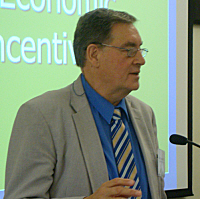
It all depended on who you found most persuasive at the Environmental Protection Agency 40th Anniversary Conference, held Friday at the Great Hall on the St. Croix campus of the University of the Virgin Islands.
The debate on waste-to-energy programs was a highlight of the morning session, which included speeches by Gov. John deJongh Jr., EPA Region 2 Administrator Judith Enck and Delegate to Congress Donna Christensen. More than 220 people attended the conference.
Former Sen. Holland Redfield, who moderated the debate, said he preferred to think of it as a conversation or a dialogue about the issue. But whatever you called it, a dispassionate observer would have to score it as a win for the anti-incinerator speaker, Paul Connett.
Andy Hixon, the vice president from Alpine Energy – the group seeking to build a waste-to-energy plant on St. Croix – seemed like a knowledgeable guy, pleasant and well spoken, and he made his points clearly. But Friday morning he seemed like a man who ran into a buzzsaw when he faced off against Connett, a professor of chemistry at St. Lawrence University who has made a career of battling waste-to-energy programs.
Connett said his presentation usually runs an hour, but he had to fit it into the 15 minutes of the debate format. But he didn’t leave anything out, his voice coming in an impassioned rush, his hands flying as he outlined his position.
The status quo is a linear system, he said. People find resources, digging them out of the earth or growing them or harvesting them. Those resources are manufactured into products that consumers use, then throw away the remaining waste, which is buried in landfills.
Replacing the landfill with an incinerator doesn’t change the equation, Connett said. It’s still a one-way path from resource extraction to garbage, and the only way to continue it is to go back to the beginning and find more resources.
"Neither landfills or incinerators are sustainable," Connett said.
Further, he said, because of the sheer scale of their economics, incinerator projects lock communities into a 20 or 30 years or longer commitment, limiting their options in the future. He cited examples of cities that had invested millions in building incinerators and signed contracts committing them to provide the waste to fuel them.
That made it impossible for them to later establish recycling programs, since their waste stream was committed to the incinerator. And the incinerators created relatively few jobs for the money invested.
Comprehensive recycling programs, on the other hand, are less expensive and create thousands of jobs, according to Connett.
The chemistry professor also said incinerators create a ton of ash for every four tons of trash burned, and that ash poses serious environmental questions. Incinerators have to meet discharge standards, but Connett said they produce nano-particles, "exquisitely toxic," that are not regulated.
Instead, he urges composting and recycling on a much wider scale. Connett said when he first began preaching recycling, he was told if he called for diverting more than 15 percent of the waste stream people would think he was crazy and not listen to him. Since then the world has changed, and recycling is a big part of it.
San Francisco, a city of 850,000 people, was recycling 70 percent of its waste by 2008, and by 2010 it was 75 percent, with 77 percent expected this year.
To make a composting/recycling program work, he said, you have to make it easy for the consumers, and you have to provide incentives for them to take part. And people respond to that, he said.
"When you burn that in an incinerator you’re admitting failure. You’re saying ‘We weren’t clever enough to figure out how to reuse our waste.’"
Hixon, when it was his turn, found himself agreeing with many of Connett’s points about recycling. But recycling is a key part of the Alpine proposal, he said.
The trash collection and processing stations the company wants to build on St. Tomas and St. Croix would sort and separate the trash, extracting metals, glass and other recyclable materials before turning the remainder into a pelletized fuel that would be burned in an incinerator on St. Croix.
"It’s not either-or, recycling is a key component of this project and always has been," he said. "Our project goes a long way to helping with recycling."
With islanders producing about three times more trash per person than the U.S. average and the territory’s landfills all but filled and under federal pressure to close, waste-to-energy projects promise to help the islands deal with their waste problems.
And the Water and Power Authority would buy electricity from the generator, helping reduce the dependence on foreign oil. With all of WAPA’s power generated by burning fossil fuels, Hixon said, "When you turn on a light bulb, you’re burning fuel oil."
Alpine could provide 15 percent of the power in the territory, 30 percent for St. Croix, Hixon said.
He also said the incinerator would be continuously monitored by the EPA and local inspectors to make sure it was not exceeding acceptable limits for toxic emissions, although he did not address Connett’s claims about nano-toxins.
"We are doing everything we can to reduce the pollutants from the combustion process," he said "If you don’t do enough, you won’t get a permit."
Also on the agenda at Friday’s conference, held in honor of the 40th anniversary of the creation of the EPA, was a panel discussion of the V.I. Recycling Partnership, Air Pollution Control in the Virgin Islands, and a session on "Towards a Green Virgin Islands."





